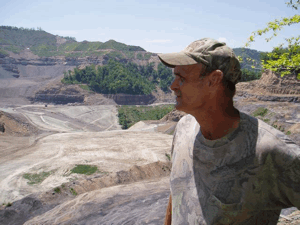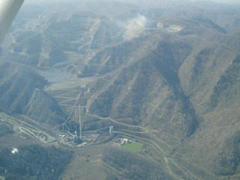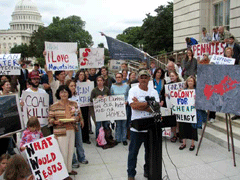Marsh Fork Elementary Update
Air Date: Week of May 7, 2010

"Like maggots eating our mountainsides." Ed Wiley looks over the mountaintop removal mine just above Marsh Fork Elementary. The ridgeline in the distance will soon be leveled by explosives and the rock and dirt dumped in the valley below. (Photo: Jeff Young)
An elementary school in a small West Virginia community sits precariously close to a coalmine. Host Jeff Young talks with resident Ed Wiley about his successful campaign to raise money to rebuild the school out of harm’s way.
Transcript
YOUNG: It’s Living on Earth I’m Jeff Young. Now an update on a story and a little good news for an area that’s had its share of bad—the coal country of southern West Virginia, scene of last month’s mining disaster.
Three years ago we told you about Marsh Fork Elementary, where kids go to school in the shadow of a mountaintop removal coal mine. Dust and fumes from the mine’s coal preparation plant waft over the school. Ed Wiley’s granddaughter, Kayla, was a student there. Wiley told us his granddaughter and other students kept getting mysterious headaches and nausea.
WILEY: And she says, gramps these coalmines are making us kids sick. That hurt. That hurt me. You know, it took her tears to wake me up. And it was like a sledgehammer.
YOUNG: Wiley also discovered that the school is downhill from a massive earthen dam that holds back a lagoon of semi-liquid waste left over from washing coal.
WILEY: And when you've got two point eight billion gallons of toxic sludge sitting over an elementary school, it's not good.

"Like maggots eating our mountainsides." Ed Wiley looks over the mountaintop removal mine just above Marsh Fork Elementary. The ridgeline in the distance will soon be leveled by explosives and the rock and dirt dumped in the valley below. (Photo: Jeff Young)
YOUNG: Wiley was determined to get the kids out of harm’s way. When state and local officials showed little interest in moving the school, Wiley did some moving of his own. He walked all the way to Washington D.C.—a 450-mile, 40-day hike to raise awareness and money to build a new school. It took three years, but his group, Pennies of Promise, recently met its funding goal, making a new Marsh Fork Elementary possible. Ed Wiley, welcome back to living on Earth.
WILEY: Thank you Jeff, how’re you doin’?
YOUNG: I’m doing very well. Well, how does it feel to finally have the money for a new school?
WILEY: It’s not hitting me yet, believe it or not, it’s had a few tears here and there, but I guess the big day is when I come down that road and see the children actually walking in that school. And that’ll be my biggest and greatest reward right there.
YOUNG: Now, this all started with you and your long walk trying to raise money to build a new school. How much did you raise in that first effort there, walking all the way to Washington, D.C.?
WILEY: Well, we first opened up a campaign with different environmental groups a there was a bunch of kids from New York City. Those kids sent 350 dollars. And we had 350 dollars. And we did the walk to draw awareness to reach out to people. We raised 10,400 dollars.

Learning in the shadow of coal. A Massey Energy company coal silo looms over Marsh Fork Elementary. The company wanted to build a second silo even closer to the school. Some parents call the mine a health and safety risk. School principal Louise Maynard says, "we are all going to die of something." (Photo: Jeff Young)
WILEY: Well, when we started out the price tag was a little over five million and you know as time goes by everything goes up—we needed around eight to nine million to do the job.
YOUNG: Now, a million and a half is coming from Massey Energy. This is the company that operated the mine where 29 men died in that disaster. This is the company that operates the mountaintop removal site right next to Marsh Fork Elementary. How do you feel about taking their money for this?
WILEY: Well, you know, everybody’s responsible. Everybody is involved, and you know, they probably should have paid for the whole thing. Why step up to the plate now? They could have built a school long, long time ago. So it’s all political, it’s all everybody’s going to jump on board now and say, well, we helped out this school. And it’s fine; we’ll take their money, anything! Let’s get the kids out of there.
YOUNG: And do you know when the new school might happen?
WILEY: Well, they said they was going to get this moving right away, starting Monday and we found out things are moving. We’re talking 14 months they said, have this new school built—usually takes a little over two years, but they’re going to jump on this right away and get things moving and get this happening and they said about 14 months.

The Massey Energy coal company's slurry impoundment and dam. The small white square in the lower foreground is Marsh Fork Elementary. In 2000, another Massey-owned impoundment failed, releasing tons of liquid waste. "It just does not make sense," mine safety expert Davitt McAteer says, "to put a school and impoundment in close proximity." (Photo: Jeff Young)
YOUNG: Wow. That seems pretty fast.
WILEY: Well, it is, but it’s not fast enough. We need to get them moving a little quicker, I feel we should get some portable classrooms somewhere and go ahead and get the children out of there. It’s still not safe, and just keep working and pray that nothing happens, and the 14 months will come quick.
YOUNG: You and others there have been sounding the alarm for a long time about your concerns about the safety with the slurry impoundment and the blasting and coal preparation plant right near the elementary school there. Do you think the disaster at the Upper Big Branch mine, just up the road there, has changed people’s thinking about this and made them perhaps more receptive to your message that there is potential danger here?
WILEY: Well, of course there’s always been potential danger and yes I hope they would feel that way. You know, we just lost miners probably because of a mine that had a lot of violations, which there’s no probably to it—it did, there were many, many violations there. I been telling people for five and a half years, the dam itself behind Marsh Fork Elementary has violations. Until certain occurrences happen this thing will fail and 977 lives will perish. Just like I say, this is why people die in coal mining accidents because there’s permits that have been filed, but nobody’s enforcing them.
YOUNG: I understand there’s a move afoot to have the new school named Ed Wiley Elementary. What do you think of that?

The kids in coal country "deserve a safe, healthy place to go to school," Ed Wiley says on Capitol Hill. He walked all the way from his West Virginia home to raise awareness about Marsh Fork Elementary. (Photo: Vivian Stockman)
WILEY: Well, it would be a great honor, but it does not matter to me. This is for the children and this is for the community, you know, it’s not about me and lets call it the children’s school, whatever, you know? But no, I would be very honored if it would be, but it does not matter at this point. We got the kids in a safe place, now, it does help save the community, but it didn’t stop mountain top removal, and we still have many, many problems here to face and the battle’s not over.
YOUNG: Ed Wiley talking to us about the new home for Marsh Fork Elementary. Thank you very much.
WILEY: Okay, thank you.
YOUNG: I’ll never forget that September day in 2006 when Ed Wiley walked up Capitol Hill in Washington. He’d come a long way to speak his mind, and here’s what he had to say:
WILEY: These kids deserve a chance. Just because they're in the coalfields we'll not be belittled no more. We'll not be beaten down no more. All the children in the Appalachian Mountains need a safe, healthy environment to go to school in.
[CHEERS FROM CROWD]
[MUSIC: Bill Frisell: Creep” from Ghost Town (Nonesuch Records 2000)]
Links
Living on Earth wants to hear from you!
Living on Earth
62 Calef Highway, Suite 212
Lee, NH 03861
Telephone: 617-287-4121
E-mail: comments@loe.org
Newsletter [Click here]
Donate to Living on Earth!
Living on Earth is an independent media program and relies entirely on contributions from listeners and institutions supporting public service. Please donate now to preserve an independent environmental voice.
NewsletterLiving on Earth offers a weekly delivery of the show's rundown to your mailbox. Sign up for our newsletter today!
 Sailors For The Sea: Be the change you want to sea.
Sailors For The Sea: Be the change you want to sea.
 The Grantham Foundation for the Protection of the Environment: Committed to protecting and improving the health of the global environment.
The Grantham Foundation for the Protection of the Environment: Committed to protecting and improving the health of the global environment.
 Contribute to Living on Earth and receive, as our gift to you, an archival print of one of Mark Seth Lender's extraordinary wildlife photographs. Follow the link to see Mark's current collection of photographs.
Contribute to Living on Earth and receive, as our gift to you, an archival print of one of Mark Seth Lender's extraordinary wildlife photographs. Follow the link to see Mark's current collection of photographs.
 Buy a signed copy of Mark Seth Lender's book Smeagull the Seagull & support Living on Earth
Buy a signed copy of Mark Seth Lender's book Smeagull the Seagull & support Living on Earth

